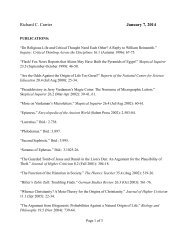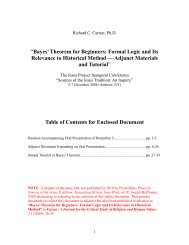Cultural History of the Lunar and Solar Eclipse in ... - Richard Carrier
Cultural History of the Lunar and Solar Eclipse in ... - Richard Carrier
Cultural History of the Lunar and Solar Eclipse in ... - Richard Carrier
Create successful ePaper yourself
Turn your PDF publications into a flip-book with our unique Google optimized e-Paper software.
<strong>and</strong> predictability <strong>of</strong> eclipses, even <strong>the</strong> distance between Earth <strong>and</strong> moon, or <strong>the</strong>y at<br />
least understood <strong>the</strong> basic reason<strong>in</strong>g available to those expert astronomers who could<br />
do <strong>the</strong>se th<strong>in</strong>gs. This was all an ord<strong>in</strong>ary part <strong>of</strong> <strong>the</strong>ir world, however much or little <strong>the</strong>y<br />
understood it. And <strong>the</strong> bulk <strong>of</strong> <strong>the</strong>ir <strong>in</strong>formation comes from <strong>the</strong> one th<strong>in</strong>g that is most<br />
available to <strong>the</strong> educated elite: <strong>the</strong> ability to compare notes with observers <strong>in</strong> distant<br />
locations. It was easy to be ignorant <strong>of</strong> <strong>the</strong> simple fact that solar eclipses are only<br />
visible <strong>in</strong> small tracks on <strong>the</strong> Earth, <strong>and</strong> that <strong>the</strong>y appear differently when viewed from<br />
different locations. Lack<strong>in</strong>g this <strong>in</strong>formation (<strong>and</strong> how could <strong>the</strong> commons get hold <strong>of</strong><br />
it?), when “<strong>the</strong> sun failed” <strong>the</strong>n surely “darkness came upon <strong>the</strong> whole Earth.” 117 Even<br />
Pl<strong>in</strong>y, <strong>in</strong> a moment <strong>of</strong> ignorant self-contradiction, could make this mistake. 118<br />
III. Superstitions<br />
The common man lacked access to coord<strong>in</strong>ated global <strong>in</strong>formation, as well as an<br />
education <strong>in</strong> natural history, <strong>and</strong> enculturation <strong>in</strong>to a rational philosophy directed toward<br />
f<strong>in</strong>d<strong>in</strong>g regular <strong>and</strong> natural causes for th<strong>in</strong>gs. He may have even felt a measure <strong>of</strong><br />
distrust or contempt for <strong>the</strong>se th<strong>in</strong>gs. He was thus left to fend for himself <strong>in</strong> a sea <strong>of</strong><br />
familiar superstitions. Instead <strong>of</strong> see<strong>in</strong>g an eclipse as evidence <strong>of</strong> an ordo naturalis<br />
unconcerned with human affairs, it was seen as a portentum, a capricious act <strong>of</strong> gods,<br />
demons, or wizards, which usually guaranteed at least someone’s doom. But this was<br />
not merely <strong>the</strong> poor man’s religion. Educated elites could share similar superstitions.<br />
Whe<strong>the</strong>r <strong>the</strong>ir status as portent was truly believed or not, eclipses were regularly<br />
reported as bod<strong>in</strong>g ill for someone. But superstitions were not restricted to <strong>the</strong> magical<br />
or div<strong>in</strong>e. Naturalist superstitions abided as well. Aristotle would beg<strong>in</strong> <strong>the</strong> trend when<br />
describ<strong>in</strong>g how lunar eclipses co<strong>in</strong>cide with earthquakes, <strong>and</strong> presage storms. 119 And<br />
follow<strong>in</strong>g this, we f<strong>in</strong>d <strong>the</strong> elder Pl<strong>in</strong>y comb<strong>in</strong><strong>in</strong>g two <strong>of</strong> <strong>the</strong>se events, 120 as well as<br />
Virgil 121 <strong>and</strong> even <strong>the</strong> author <strong>of</strong> <strong>the</strong> Gospel <strong>of</strong> Mat<strong>the</strong>w (27.44-8).<br />
In <strong>the</strong> realm <strong>of</strong> myth, we see possible syncretism <strong>in</strong> both directions. The<br />
traditional mythology apparently held that Selene (<strong>the</strong> moon) had monthly love affairs <strong>in</strong><br />
a cave with her lover Endymion, an obvious folk tale expla<strong>in</strong><strong>in</strong>g <strong>the</strong> new moon. 122 But<br />
117 Luke 23.44-45: skÒtow §g°neto §fÉ ~lhn tØn g∞n...toË ≤l€ou §klipÒntow.<br />
118 Natural <strong>History</strong>, 2.8.(49), “Surely <strong>the</strong> entire sun could not be removed from <strong>the</strong> world by <strong>the</strong> <strong>in</strong>terposition <strong>of</strong> <strong>the</strong><br />
moon if <strong>the</strong> earth were larger than <strong>the</strong> moon” (non posset quippe totus sol adimi terris <strong>in</strong>tercedente luna si terra<br />
maior esset quam luna). This is an absurd argument unless one is unaware <strong>of</strong> <strong>the</strong> reported magnitudes <strong>of</strong> eclipses<br />
seen <strong>in</strong> different locations, <strong>and</strong> <strong>the</strong> fact that <strong>the</strong> same eclipse is not even seen at o<strong>the</strong>r places, where <strong>the</strong> sun<br />
cont<strong>in</strong>ues to sh<strong>in</strong>e. This <strong>in</strong>formation was known <strong>in</strong> Pl<strong>in</strong>y’s day, <strong>and</strong> must have been known to Hipparchus, <strong>and</strong><br />
Pl<strong>in</strong>y’s ignorance is odd. Dio Cassius knew this simple fact, <strong>and</strong> <strong>the</strong> decree <strong>of</strong> Claudius may have mentioned it as<br />
well (60.26.3). But worse for Pl<strong>in</strong>y is that it contradicts his own argument that <strong>the</strong> Earth’s shadow is conical<br />
(Natural <strong>History</strong>, 2.7.(47-8)), for if <strong>the</strong> moon were larger, <strong>the</strong>n <strong>the</strong> Earth’s shadow could never eclipse it.<br />
119 Meteorology, 367b2.<br />
120 Natural <strong>History</strong>, 2 (195).<br />
121 Georgics, 2.47.478-480.<br />
122 Sappho, fr. 199; Apollonius <strong>of</strong> Rhodes, Argonautica, 4.57-67.








